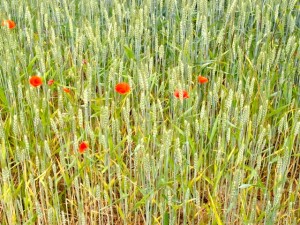 Today is the 100th anniversary of the battle of Fromelles. Until 2008/9, few Australians had heard of this tiny village on the old Western Front, or of the fighting that took place there in 1916. Very few towns in Australia included the name “Fromelles” on the war monuments listing their dead sons.
Today is the 100th anniversary of the battle of Fromelles. Until 2008/9, few Australians had heard of this tiny village on the old Western Front, or of the fighting that took place there in 1916. Very few towns in Australia included the name “Fromelles” on the war monuments listing their dead sons.
Photo courtesy Bobbie Ruben – Poppies in a Fromelles field
In 2008 my husband Lex, our daughter Ali and two friends were sailing our boat Malaika in southern Borneo, where we met Caroline Barker, a British forensic anthropologist. I was fascinated by Caroline’s stories about her work, which had taken her to some of the worst atrocities in war-torn parts of the globe, including Bosnia, Guatemala and Timor, recovering and identifying victims of mass killings. Her next job was a dig at a place called Pheasant Wood, in northern France, a WW1 battlefield. She said, “You Australians are obsessed about Gallipoli, and rightly so, but Fromelles was a much bigger disaster.” As soon as I was home again, I began reading.
In 1916, some 6 months after the evacuation from Gallipoli, Australian soldiers fought their first major battle in Europe. The Battle of the Somme had begun on 1 July, and the action at Fromelles was intended to draw German troops away from the Somme. It was a complete disaster.
The fighting began at 6pm, along a front of less than 4000 metres. It ended about 9am the following morning, but most of the casualties were sustained by 9pm the first evening. Three hours. In that time, 1701 Australians were killed, a further 216 died of wounds, 470 were taken prisoner, and 3146 were wounded. 5533 Australian soldiers taken out of the conflict in just one night. As Robin Corfield writes in “Don’t forget me, cobber” : “These losses were the highest for one Australian Division in one day in the whole war, the 60th Battalion’s losses the highest for any Australian battalion in a single action.”
The morning after, the Germans asked for a ceasefire in order to collect the casualties. The generals, including Australian General McCay, refused, so young German soldiers were sent out under cover of night to collect as many of the dead as they could. They recovered enemy dead as well as their own, and the bodies were searched for ID which was later sent to the Red Cross. 250 Allied dead were buried behind the German lines at Pheasant Wood, near the village of Fromelles.
Many years later, a Melbourne history teacher named Lambis Englezos met survivors of the battle and became interested in the history. He realised after much investigation that there were men not accounted for on the lists at the VC Corner cemetery. In his words: “…the number of Australian soldiers who died at Fromelles and the numbers recorded at the VC Corner Cemetery just didn’t add up.”
It took Lambis Englezos years of effort to convince authorities in Australia and Britain to agree to a search, and on the first survey in 2007, they found evidence of Australian soldiers. The following year 250 bodies were exhumed, and by 27 May 2016, 150 soldiers have been identified.
The result of my research into the battle of Fromelles was my novel Ronan’s Echo. Everything I read about it affected me profoundly. One line in particular influenced me a great deal. A woman who bought of copy of Don’t forget me, cobber, told author Robin Corfield: “The battle of Fromelles has ruined four generations of my family…at least I will know where it all started.” That’s the nub of it – the tragedy is not just the loss of life, but the damage that echoes down through the following generations from the trauma and horror that soldiers experience in war. I decided my contribution to extending an awareness of Fromelles could best be done in a way that reached people who might not read war histories.
And just last night I had the great pleasure of meeting Adjunct Professor Bill Gammage of ANU and his wife over dinner at our friends’ home. In 1974 Bill first published his ground-breaking work The Broken Years: Australian Soldiers in the Great War, and it’s been reprinted many times since. He has an abiding interest in Fromelles, so we had some great conversation – he has visited Fromelles and was an advisor to the search for the missing Australians. [and yes, I gave him a copy of Ronan’s Echo!]
Yes, when you read about the statistics (which often do not translate to emotion) you realise just how devastating this must have been to so many Australian families and the long term impact on society. Lest we forget.
It’s staggering to think of the possibilities that died with those 60,000 Australians in WW1, Robin. Our population was less than 5 million. It was a huge loss from such a small group. I wonder how different we might have been if those men had not disappeared.
And how different many families’ lives might have been without the trauma that came home with a lot of returned soldiers. – Jo